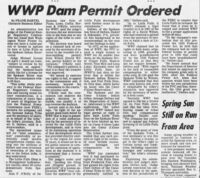1980-04-08-sc-p5-c1-little-falls-dam-permit-ordered
April 08, 1980 Spokane Daily Chronicle Page 5 Column 1:
WWP Dam Permit Ordered
By FRANK BARTEL
Chronicle Business Editor
An administrative law judge of the Federal Energy Regulatory Commission has found that Washington Water Power Co. does not have a valid permit or license to operate its dam at Little Falls on the Spokane Indian Reservation.
Judge Michael Levant on April 1 issued an order, “subject to review by the commission on appeal, that the Spokane-based utility file for a license for the Spokane River dam from the commission within 90 days.
“This order, while advisory to the Federal Energy Regulatory Commission and leaving issues for later consideration, is a culmination of more than 10 years of litigation before the Federal Power Commission (now FERC), between the company and the Spokane Indian Tribe and the secretary of interior in behalf of the tribe,” the tribe’s attorney, Robert D. Dellwo, said in a memorandum.
The unresolved issues left for “later consideration” conceivably or potentially could involve compensation claims running into the millions of dollars and even reversion of ownership of the dam site to the Indian tribe, it was understood.
The Little Falls Dam is a 38-megawatt hydroelectric facility about 30 miles downstream from Spokane.
Alan P. O’Kelly of the Spokane law firm of Paine, Lowe, Coffin, Herman & O'Kelly, attorney for WWP, said the judge’s decision did not determine title to the dam site or any rights of the tribe to compensation.
“His decision was based on a claimed lack of consent by the secretary of interior to the transfer (of a dam-building permit) from Wilson (David Wilson, permit holder) to the company,” O'Kelly said. “The company’s position is that it is clear the transfer was approved,
“We intend to exercise our rights in full, to appeal to the commission and, if necessary, beyond the commission to the courts,” the attorney said.
O'Kelly said the commission can endorse the judge’s decision as it stands, can modify it or can reverse the decision.
Levant said in his findings, “In light of the apparent good-faith belief by WWP that it was in a possession of a valid authorization by the secretary of interior for the Little Falls development, and in view of its continuing operation of that development which has provided electric energy to the region for some 70 years, it would not be in the public interest to compel the cessation of operations at the moment it is determined that a license is required.”
The judge’s order said that, “pending the filing and diligent pursuit in good faith” of a license application, WWP "may continue the operation of the Little Falls development until further order of the commission."
Dellwo, of the Spokane law firm of Dellwo, Rudolf & Schroeder, P.S., provided this background in his memorandum on the case and the findings to date:
“In 1972, on the application of WWP, the FPC issued a single license to WWP for its middle four dams on the Spokane River (Upper Falls, Monroe Street, Nine Mile and Long Lake). Excluded were the Little Falls Dam, its (WWP’s) last dam on the river that is within the Spokane Indian Reservation, and Post Falls Dam, its first dam, which backs up water into the Coeur d’Alene Reservation.”
The Spokane and the Coeur d’Alene Indian tribes, through Dellwo and the Department of Interior, intervened in the WWP specie. The tribes claimed WWP lacked any legal permit or right to have built Little Falls Dam on the Spokane River or to have backed up water on Coeur d’Alene Lake into the Coeur d’Alene Reservation.
The tribes further contended that any such permits or right to be validated must include reasonable damages and compensation to the tribes.
“WWP has contended that it had purchased its rights to Post Falls Dam from Frederick Post, who had gained his rights from Chief Seltice of the Coeur d’Alene Tribe in 1871, congressionally ratified in 1891,” Dellwo said.
“As to Little Falls, it (WWP) claimed a legal transfer to it in 1907 of the rights of a David Wilson, who had received a permit from the secretary of interior to build a dam at Little Falls.
“WWP claimed that its rights to both dams, originating in 1908, preceded and were ‘grandfathered in’ by the 1920 Federal Power Act, so that they did not require licenses,” Dellwo said. “With regard to the lack of reasonable compensation to either tribe (only $1,140 paid the Spokane Tribe by Wilson). WWP contended that that was past history and, even if inequitable by today’s standards, was approved by the secretary of interior in both cases.
“Recently WWP has agreed to file for a license for its Post Falls plant, and this has been done, leaving issues of tribal title and compensation pending,” Dellwo said. "The company has continued to oppose any federal licensing of its Little Falls plant.
“From the point of view of the Spokane Tribe, it was necessary to win this issue, forcing a license, to get to the tribe’s right to various terms and conditions, including especially damages and compensation,” the tribe’s attorney said.
Explaining the administrative law judge’s decision, Dellwo said, “Judge Levant restricted his current decision to the question of the jurisdiction of the FERC to require that Little Falls be licensed. He found that it must be licensed and ordered WWP to file a proper application within 90 days.
“To the company’s contention that its title preceded the 1920 Federal Power Act, he held that the company had no valid federal license or permit prior to 1920 that could have been ‘grandfathered’ in,” Dellwo said.
“He found instead that the Department of Interior had issued its approval of the company grant only in 1924, after the Federal Power Act, when that question would have been within the sole jurisdiction of the FPC and that, therefore, the 1924 grant was ineffective,” Dellwo said.
